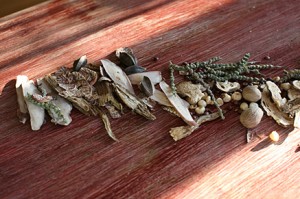About Chinese Herbs
Chinese herbal medicine has been used in the treatment of humans and animals for over 2,000 years. It is based on combining herbs together to promote balance and healing. We call our herbal formulas “Qi Blends” since they are blended together to promote health and restore harmony to the “Qi” (or vital energy) of pets.
The aim of any treatment with Chinese herbs is to bring the body and emotions into balance. We’ve identified the areas of imbalance that most often lead to health problems in cats and dogs and chosen herbs to address them.
Balance is achieved in Chinese medicine by addressing:
•
Yin & Yang –
Yin and Yang are opposites. Symptoms can be looked at in terms of yin/yang parameters. For example, dampness is yin and dryness is yang. Cold is yin and heat is yang. An herbalist’s job is to apply the theories of yin and yang to the patient. For a pet with sores on the skin – are they wet looking or dry? Are they red (indicating heat) or white (indicating cold)? Similarly with a cough – does it sound wet and phlegmy or dry? Is the pet hyperactive (indicating heat) or lethargic (indicating cold)?
•
Qi, Blood, and Body Fluids –
Qi (vital energy), blood, and body fluid are fundamental substances that sustain health. Imbalances in these three areas can cause a variety of imbalances for a pet. Qi, blood, and body fluids can be weak and deficient, in which case they are unable to nourish the body and function properly. Deficient qi can cause fatigue or dull achey pain. Deficient blood and body fluids can lead to dry, itchy skin. On the other hand – qi, blood and body fluids can be excess and overflowing in which case they become stuck or stagnant. Qi and blood that are stuck can cause a sharp, fixed pain that may be severe. On the emotional side, stuck qi can cause frustration and irritability. To attain balance, these three vital substances need to be strong and healthy in their flow.
•
Channels and Collaterals –
The channels and collaterals are considered to be a series of connecting passages through which qi and blood flow. The primary channels are indicated by the lines that are shown on acupuncture charts. Eleven of the 12 primary channels are named for organs they are associated with. It’s important to note that these organs in Chinese medicine are not the same as their western counterparts. The Chinese Kidney, for example, may have some of the same functions as the western Kidney, but it is a much broader concept than simply the anatomical organ. Chinese organs have emotions associated with them. The Chinese kidney is associated with fear. They also have an associated tissue and orifice. The tissue of the Chinese kidney is bone and the orifice is the ear. Therefore, hearing problems, brittle bones, and a feeling of fear indicate imbalance in the Kidney meridian. The anatomical kidney may be perfectly healthy in this scenario, but herbs are required to treat the Kidney meridian.
If you go to www.qiblends.com, click on “Our Blends” for a detailed description of each blend. Here we describe how the above theories apply to each product. Instead of treating a disease or symptom with just one medication, our blends treat the pet as a whole. The treatment principles explain how the blend uses herbs to balance the yin, yang, qi, blood, and body fluids, as well as the channels and associated organs. We find that the balance and interaction of all the ingredients together are more important than the effect of each ingredient on its own.

